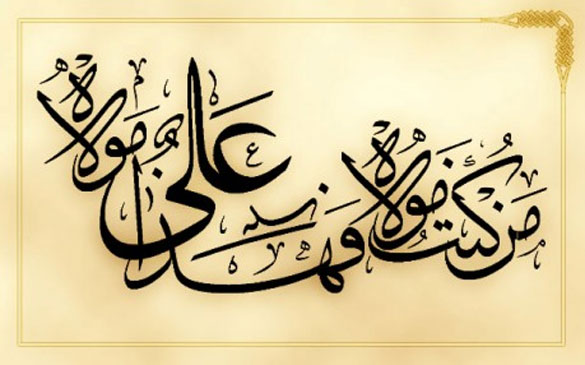Bridging The Shia-Sunni Divide In Islam: The Sufi View Of Yaum-e-Ghadir Promotes An Inclusive Understanding Of Wilaya (Spiritual And Political Authority)

By Ghulam Rasool Dehlvi, New Age Islam
19 June 2025
Main Points:
1. Shia Muslims believe Ghadir-e-Khumm marks the divinely ordained appointment of Imam Ali (AS) as both spiritual and political successor of the Prophet Muhammad.
2. Sunnis too accept the historicity of the Ghadir Khumm event. However, they interpret the Prophet’s statement as emphasizing love and spiritual closeness, not political authority.
3. The Sufi Perspective bridging the Sunni-Shia divide. While Sufis deeply revere Imam Ali as the gate to esoteric knowledge, the spiritual inheritor of the Prophet, and the source of their spiritual lineages, they generally do not emphasize political succession, focusing instead on inner (bāṭinī) spiritual authority.
4. Prominent Sufi figures (e.g., Sheikh Abdul Qadir Jilani, Data Ganj Bakhsh, Khawaja Ghareeb Nawaz) trace their spiritual chains (silsilah) through Imam Ali (AS). Therefore, for Sufis, Ghadir is an immensely significant spiritual event, not just historical or political.
5. Therefore, Ghadir serves as a bridge between Shia and Sunni Sufi traditions, rooted in shared love for the Ahl al-Bayt. It is commemorated by Sufis through dhikr, manqabat poetry, and devotional gatherings, even if not as a formal religious festival. The event teaches that true leadership is based on spiritual virtue and divine love, not on political power alone.
------

Recently, Sufi-oriented Sunni Muslims—popularly known as Ahl-e-Sunnat in the Indian subcontinent—as well as the Shias commemorated Yaum-e-Ghadir (also called Eid-e-Ghadir) with great enthusiasm, which was unprecedented in the recent history. Sufis, Shias as well as some Sunni admirers of Ahl al-Bayt jointly recalled the historic event at Ghadir-e-Khumm, where the Prophet Muhammad (pbuh) is believed to have declared: “Man kuntu mawlahu fa hādhā Aliyyun mawlahu” "Whoever I am his master (mawla), then Ali is his master." Therefore, this day holds spiritual, theological, and emotional significance, particularly regarding Imam Ali's (AS) status as the spiritual heir of the Prophet.
Significantly, the Sufi understanding of Yaum-e-Ghadir provides a balanced, unifying, and deeply spiritual interpretation. It emphasizes Imam Ali’s spiritual legacy over political claims, highlighting his role as the Qutb of sainthood and the gate to the Prophet’s inner knowledge. Ghadir, in Sufism, is a universal symbol of divine love, spiritual authority, and truth-based leadership in Islam. Before we proceed, let us take a look at the varying positions of the two major Islamic schools of thought:
The Sunni Position:
The consensus among Sunni scholars is that the incident of Ghadir Khumm is historically authentic. Prophet Muhammad (pbuh) declared the love and spiritual authority (wilayah) of Maula Ali (AS), stating: "Whoever I am a master (mawla) of, Ali is also his master." They maintain that this hadith is interpreted as referring to the spiritual concept of wilayah in love and closeness, not the wilayah of political leadership or caliphate as understood by the Shia.
The Shia Position:
But Shia Muslims firmly believe that the event of Ghadir-e-Khumm, which occurred on 18th Dhul Hijjah, 10 AH marks the formal and divine appointment of Imam Ali ibn Abi Talib (AS) as the spiritual successor (Imam) as well as the political heir (Caliph) of the Prophet Muhammad (pbuh). This event took place during the return journey from the Prophet’s Farewell Pilgrimage (Hajjat al-Wida'), when the Prophet stopped at a place called Ghadir Khumm, near present-day al-Juhfa in Arabia.
The Sufi Perspective:
All the saints and Sufis regard Hazrat Ali (may Allah be pleased with him) as the Gate of Knowledge, source of spiritual grace and gnosis, and the leader of the Imams of spiritual authority (wilayah). Figures such as Data Ganj Bakhsh, Khawaja Ghareeb Nawaz, Sheikh Abdul Qadir Jilani, and others have considered Hazrat Ali’s wilayah to be the origin of their spiritual lineages. Many among them have acknowledged the day of Ghadir as a day to honor the greatness of Ali (RA), though they did not establish it as a formal religious festival or annual practice.
Thus, Sufis across various orders regard Imam Ali as the spiritual heir (wali) of Prophet Muhammad (PBUH). While they may not emphasize political succession, they firmly uphold Ali’s status as the gate to esoteric knowledge (ʿilm al-bāṭin) and spiritual authority in Islam. Therefore, the recently held event of Yaum-e-Ghadir, also known as Eid-e-Ghadir in the Indian subcontinent marked a significant sectarian unity celebrated particularly by the Sunni Sufis and Shia Muslims. They unanimously commemorated the day when Prophet Muhammad (PBUH), during his return from his last pilgrimage (Hajjat al-Wida) in 10 AH (632 CE), is believed to have declared Imam Ali (AS) as his successor at a place called Ghadir e Khumm.
In fact, the Sufi view of Yaum-e-Ghadir is nuanced and thus it bridges elements of both Sunni and Shia understandings, reflecting Sufism’s deep spiritual orientation and reverence for Imam Ali (AS). Sufis interpret the event of Ghadir Khumm as the transmission of inner (bāṭinī) spiritual authority to Ali. Many Sufi silsilas (spiritual lineages) trace their chain of initiation (silsilah) through Imam Ali, viewing him as the first Qutb (spiritual pole) after the Prophet.
Prophet Muhammad (PBUH) is reported to have stated in an authentic hadith widely quoted in both Sufi and Shia traditions:
“I am the city of knowledge, and Ali is its gate.”
The path of Sufism is based on truth (haqiqat) and love (muhabbat), and the Ahl al-Bayt are the torchbearers of divine truth and love. Therefore, Sufism places strong emphasis on the love of the Prophet's family (Ahl al-Bayt). For many Sufis, Yaum-e-Ghadir is a day to renew devotion not only to Ali (AS), but to the entire Prophetic household. Sufis view Ghadir as more than a historical event—it symbolizes:
• The unveiling (kashf) of divine truth
• The passing of the inner Muhammadan light (nūr-i Muhammadi) to Ali
• The establishment of wilayah (spiritual guardianship) as the foundation of the Sufi path
Sufi mystics therefore deeply revered Yaum-e-Ghadir as the moment when Imam Ali was confirmed as the spiritual inheritor of the Prophet. While they may not emphasize political aspects, the spiritual significance of Ali’s appointment is central to Sufi metaphysics and practice. In the heart of the Islamic spirituality, Yaum-e-Ghadir stands as a radiant yet often underappreciated moment—a confluence of history, faith, and mystical truth. While commonly framed in sectarian terms—celebrated as the formal appointment of Imam Ali (AS) by Prophet Muhammad (PBUH) in Shia Islam, and more cautiously regarded in Sunni traditions—the day carries a rich and unifying resonance in the world of Sufism. To the Sufi, Ghadir is not merely an event. It is an unfolding of spiritual succession, a transmission of divine light, and a declaration of love as leadership.
Beyond Politics: The Inner Light of Ghadir
At the oasis of Ghadir e Khumm, the Prophet is reported to have declared, "Man kuntu mawlahu fa hādhā Aliyyun mawlahu"—“For whoever I am his mawla, Ali is his mawla.” The term mawla carries deep ambiguity: it can mean master, friend, protector, or spiritual guide. Where the jurists debated its political implication, the Sufis found something more enduring: the Prophet was revealing Ali as the inheritor of his esoteric knowledge, the gate to the City of Divine Reality.
This is the Ali whom Sufi poet Rumi praised as the one “whose sword was for justice, but whose heart was for God.” To the Sufi, Ghadir is a celestial unveiling, not a mere historical declaration. It marks the moment when the batin (inner truth) of Prophethood met the wilayah (spiritual guardianship) of Ali—an inheritance not of thrones, but of light.
Ali: The Qutb of the Saints
The vast majority of Sufi orders trace their spiritual lineage (silsilah) through Imam Ali. From the Qadiriyya of Abdul Qadir Jilani to the Chishtiyya, Naqshbandiyya, and Shadhiliyya, Ali is venerated as the first qutb (axis) of sainthood, the bearer of Prophetic secrets passed on through love, proximity, and divine favor. As the Prophet said, “I am the city of knowledge, and Ali is its gate.” This hadith is no mere flourish in Sufi metaphysics—it is the blueprint of spiritual transmission. In this light, Ghadir is not about succession in governance, but succession in gnosis (ma‘rifah). Ali becomes the living flame of Muhammadan Light, the archetype of the friend of God (waliyyullah), from whom the Sufi path emerges like a river from a spring.
Love as Leadership
Central to the Sufi celebration of Yaum-e-Ghadir is the principle of maḥabba (divine love). Leadership in Sufism is not authority by appointment or heredity—it is leadership through presence, through an overflowing of love, humility, and service. In Ali, Sufis find a saint who lived the paradoxes of divine proximity: the warrior who wept in prayer, the caliph who mended his own shoes, the scholar who said, “A person is either your brother in faith or your equal in humanity.”For the Sufi, Ghadir is a testimony that love is leadership. The Prophet raised Ali’s hand not just to honor him, but to model the principle that those closest to the divine are those most fit to guide others—not through power, but through love, sacrifice, and inner illumination.
A Message for All Hearts
In an age marred by sectarian tension and religious literalism, Yaum-e-Ghadir offered a luminous bridge. It invited us to reflect not just on who should lead, but on how one should lead. The Sufi answer is clear: by embodying the character of Ali—the knower of God, the lover of truth, the defender of the oppressed, and the mirror of the Prophet’s heart.
Though largely celebrated within Shia communities as Eid al-Ghadir, there was a quiet and contemplative commemoration in many Sufi khānqāhs and dargāhs. There, one may find the murmuring of dhikr, the singing of manqabats (devotional poetry) in praise of Ali, and the sharing of food and joy in his memory. While lacking formal ritual, the essence of Ghadir lives on in every Sufi who walks the path of love with Maula Ali as their spiritual anchor and eternal master. On this Ghadir, they recalled the essential message of Maula Ali (AS) that leadership without love is tyranny, and love without truth is illusion. But where love, truth, and divine presence meet, there you will find Ali.
Though the day of Ghadir was not celebrated during the time of the Prophet, the Companions, the Followers (Tabi'in), or their Followers (Taba' Tabi'in), it emerged later, mainly as expression of deep love and as commemorative event. Therefore, it may not be considered part of religious rituals (sha'air al-deen) but rather historical consciousness. No one refers to the commemoration of Ghadir as blameworthy innovation (bid‘ah dalalah) or a bad Sunnah (sunnah sayyi’ah); instead, it is rightly referred to as good innovation (bid‘ah hasanah) or a righteous practice (sunnah hasanah).
Thus, if a Sunni observes Ghadir Day in this same spirit — i.e., to express love for Maula Ali (AS), devotion to the Ahl al-Bayt, without the Shia belief in a divine appointment to leadership — then one must stop calling it a deviant innovation (bid‘ah dalalah), bad Sunnah, or a Rafidi symbol. This is totally unjust.
-----
A Regular Columnist with Newageislam.com, Ghulam Rasool Dehlvi is an Indo-Islamic scholar, author of “Ishq Sufiyana: Untold Stories of Divine Love”, Sufi poet and English-Arabic-Urdu-Hindi writer with a background in a leading Sufi Islamic seminary in India.
New Age Islam, Islam Online, Islamic Website, African Muslim News, Arab World News, South Asia News, Indian Muslim News, World Muslim News, Women in Islam, Islamic Feminism, Arab Women, Women In Arab, Islamophobia in America, Muslim Women in West, Islam Women and Feminism
